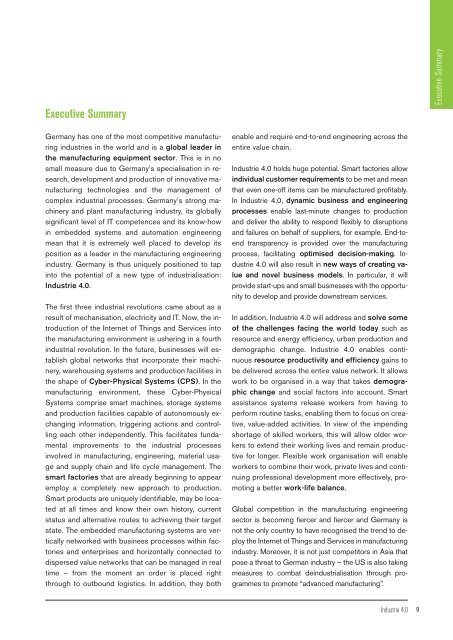Umsetzungsempfehlungen für das Zukunftsprojekt Industrie 4.0
Umsetzungsempfehlungen für das Zukunftsprojekt Industrie 4.0
Umsetzungsempfehlungen für das Zukunftsprojekt Industrie 4.0
Sie wollen auch ein ePaper? Erhöhen Sie die Reichweite Ihrer Titel.
YUMPU macht aus Druck-PDFs automatisch weboptimierte ePaper, die Google liebt.
Executive Summary<br />
Germany has one of the most competitive manufacturing<br />
industries in the world and is a global leader in<br />
the manufacturing equipment sector. This is in no<br />
small measure due to Germany’s specialisation in research,<br />
development and production of innovative manufacturing<br />
technologies and the management of<br />
complex industrial processes. Germany’s strong machinery<br />
and plant manufacturing industry, its globally<br />
significant level of IT competences and its know-how<br />
in embedded systems and automation engineering<br />
mean that it is extremely well placed to develop its<br />
position as a leader in the manufacturing engineering<br />
industry. Germany is thus uniquely positioned to tap<br />
into the potential of a new type of industrialisation:<br />
<strong>Industrie</strong> <strong>4.0</strong>.<br />
The first three industrial revolutions came about as a<br />
result of mechanisation, electricity and IT. Now, the introduction<br />
of the Internet of Things and Services into<br />
the manufacturing environment is ushering in a fourth<br />
industrial revolution. In the future, businesses will establish<br />
global networks that incorporate their machinery,<br />
warehousing systems and production facilities in<br />
the shape of Cyber-Physical Systems (CPS). In the<br />
manufacturing environment, these Cyber-Physical<br />
Systems comprise smart machines, storage systems<br />
and production facilities capable of autonomously exchanging<br />
information, triggering actions and controlling<br />
each other independently. This facilitates fundamental<br />
improvements to the industrial processes<br />
involved in manufacturing, engineering, material usage<br />
and supply chain and life cycle management. The<br />
smart factories that are already beginning to appear<br />
employ a completely new approach to production.<br />
Smart products are uniquely identifiable, may be located<br />
at all times and know their own history, current<br />
status and alternative routes to achieving their target<br />
state. The embedded manufacturing systems are vertically<br />
networked with business processes within factories<br />
and enterprises and horizontally connected to<br />
dispersed value networks that can be managed in real<br />
time – from the moment an order is placed right<br />
through to outbound logistics. In addition, they both<br />
enable and require end-to-end engineering across the<br />
entire value chain.<br />
<strong>Industrie</strong> <strong>4.0</strong> holds huge potential. Smart factories allow<br />
individual customer requirements to be met and mean<br />
that even one-off items can be manufactured profitably.<br />
In <strong>Industrie</strong> <strong>4.0</strong>, dynamic business and engineering<br />
processes enable last-minute changes to production<br />
and deliver the ability to respond flexibly to disruptions<br />
and failures on behalf of suppliers, for example. End-toend<br />
transparency is provided over the manufacturing<br />
process, facilitating optimised decision-making. <strong>Industrie</strong><br />
<strong>4.0</strong> will also result in new ways of creating value<br />
and novel business models. In particular, it will<br />
provide start-ups and small businesses with the opportunity<br />
to develop and provide downstream services.<br />
In addition, <strong>Industrie</strong> <strong>4.0</strong> will address and solve some<br />
of the challenges facing the world today such as<br />
resource and energy efficiency, urban production and<br />
demographic change. <strong>Industrie</strong> <strong>4.0</strong> enables continuous<br />
resource productivity and efficiency gains to<br />
be delivered across the entire value network. It allows<br />
work to be organised in a way that takes demographic<br />
change and social factors into account. Smart<br />
assistance systems release workers from having to<br />
perform routine tasks, enabling them to focus on creative,<br />
value-added activities. In view of the impending<br />
shortage of skilled workers, this will allow older workers<br />
to extend their working lives and remain productive<br />
for longer. Flexible work organisation will enable<br />
workers to combine their work, private lives and continuing<br />
professional development more effectively, promoting<br />
a better work-life balance.<br />
Global competition in the manufacturing engineering<br />
sector is becoming fiercer and fiercer and Germany is<br />
not the only country to have recognised the trend to deploy<br />
the Internet of Things and Services in manufacturing<br />
industry. Moreover, it is not just competitors in Asia that<br />
pose a threat to German industry – the US is also taking<br />
measures to combat deindustrialisation through programmes<br />
to promote “advanced manufacturing”.<br />
<strong>Industrie</strong> <strong>4.0</strong> 9<br />
Executive Summary





